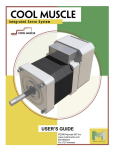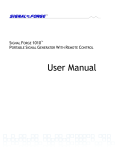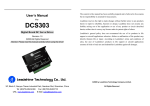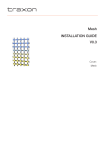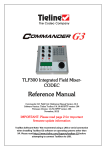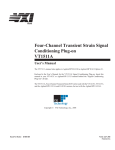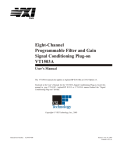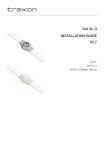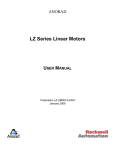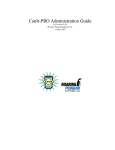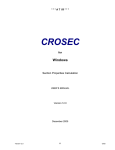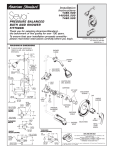Download LC Series Linear Motor User Manual, LC-UM001C-EN-P
Transcript
ANORAD LC Series Linear Motors USER MANUAL October 2006 Item Number 814036 Publication Number LC-UM001C-EN-P i Important User Information Because of the variety of uses for the products described in this publication, those responsible for the application and use of this motor assembly must satisfy themselves that all necessary steps have been taken to assure that each application and use meets all performance and safety requirements, including any applicable laws, regulations, codes and standards. The illustrations, charts, sample programs and layout examples shown in this guide are intended solely for purposes of example. Since there are many variables and requirements associated with any particular installation, Anorad does not assume responsibility or liability (to include intellectual property liability) for actual use based upon the examples shown in this publication. Reproduction of the contents of this copyrighted publication, in whole or part, without written permission of Anorad Corporation, is prohibited. Throughout this manual we use notes to make you aware of safety considerations: ATTENTION ! Identifies information about practices or circumstances that can lead to personal injury or death, property damage or economic loss Attention statements help you to: • identify a hazard • avoid a hazard • recognize the consequences IMPORTANT Item Number 814036 - Rev C Identifies information that is critical for successful application and understanding of the product. Table of Contents Important User Information. . . . . . . . . . . . . . . . . . . . . . . . . . . . . . . . . . . . . . . . . . . . . . . . . . . . . . . . . . . . . . . . . i Introduction Using This Manual. . . . . . . . . . . . . . . . . . . . . . . . . . . . . . . . . . . . . . . . . . . . . . . . . . . . . . . . . . . . . . . . . . . . . . Product Description . . . . . . . . . . . . . . . . . . . . . . . . . . . . . . . . . . . . . . . . . . . . . . . . . . . . . . . . . . . . . . . . . . . . General . . . . . . . . . . . . . . . . . . . . . . . . . . . . . . . . . . . . . . . . . . . . . . . . . . . . . . . . . . . . . . . . . . . . . . . . . . . Product Line Description . . . . . . . . . . . . . . . . . . . . . . . . . . . . . . . . . . . . . . . . . . . . . . . . . . . . . . . . . . . . . Motor Features . . . . . . . . . . . . . . . . . . . . . . . . . . . . . . . . . . . . . . . . . . . . . . . . . . . . . . . . . . . . . . . . . . . . . Maintenance . . . . . . . . . . . . . . . . . . . . . . . . . . . . . . . . . . . . . . . . . . . . . . . . . . . . . . . . . . . . . . . . . . . . . . . . . . . 1-1 1-1 1-1 1-1 1-2 1-2 Installation Unpacking and Inspection . . . . . . . . . . . . . . . . . . . . . . . . . . . . . . . . . . . . . . . . . . . . . . . . . . . . . . . . . . . . . . . .2-1 Identifying the Linear Motor Type . . . . . . . . . . . . . . . . . . . . . . . . . . . . . . . . . . . . . . . . . . . . . . . . . . . . . . . . . 2-2 Coil Assembly (example) . . . . . . . . . . . . . . . . . . . . . . . . . . . . . . . . . . . . . . . . . . . . . . . . . . . . . . . . . . . . . 2-2 Magnet Track Only . . . . . . . . . . . . . . . . . . . . . . . . . . . . . . . . . . . . . . . . . . . . . . . . . . . . . . . . . . . . . . . . . . 2-2 Cooling Plate . . . . . . . . . . . . . . . . . . . . . . . . . . . . . . . . . . . . . . . . . . . . . . . . . . . . . . . . . . . . . . . . . . . . . . . 2-2 Motor Layout Drawings . . . . . . . . . . . . . . . . . . . . . . . . . . . . . . . . . . . . . . . . . . . . . . . . . . . . . . . . . . . . . . . . . .2-3 Motor Storage . . . . . . . . . . . . . . . . . . . . . . . . . . . . . . . . . . . . . . . . . . . . . . . . . . . . . . . . . . . . . . . . . . . . . . . . .2-15 Mounting . . . . . . . . . . . . . . . . . . . . . . . . . . . . . . . . . . . . . . . . . . . . . . . . . . . . . . . . . . . . . . . . . . . . . . . . . . . . .2-15 Motor Air Gap . . . . . . . . . . . . . . . . . . . . . . . . . . . . . . . . . . . . . . . . . . . . . . . . . . . . . . . . . . . . . . . . . . . . 2-15 Motor Mechanical Installation Procedure . . . . . . . . . . . . . . . . . . . . . . . . . . . . . . . . . . . . . . . . . . . . . . . 2-15 Electrical Wiring/Interface Specifications . . . . . . . . . . . . . . . . . . . . . . . . . . . . . . . . . . . . . . . . . . . . . . . . . . .2-19 Motor/Hall Phasing and Sequence. . . . . . . . . . . . . . . . . . . . . . . . . . . . . . . . . . . . . . . . . . . . . . . . . . . . . . . . .2-21 Operational Guidelines . . . . . . . . . . . . . . . . . . . . . . . . . . . . . . . . . . . . . . . . . . . . . . . . . . . . . . . . . . . . . . . . . .2-22 Motor (Coil) Thermal Protection . . . . . . . . . . . . . . . . . . . . . . . . . . . . . . . . . . . . . . . . . . . . . . . . . . . . . . . . . .2-23 Troubleshooting Hall Effect/Thermal Signal Module Troubleshooting and Replacing . . . . . . . . . . . . . . . . . . . . . . . . . . . . . .3-1 Troubleshooting the module: . . . . . . . . . . . . . . . . . . . . . . . . . . . . . . . . . . . . . . . . . . . . . . . . . . . . . . . . . . 3-1 Removal/Installation of the Hall Effect Module: . . . . . . . . . . . . . . . . . . . . . . . . . . . . . . . . . . . . . . . . . . 3-2 Basic Motor Checks - Electrical . . . . . . . . . . . . . . . . . . . . . . . . . . . . . . . . . . . . . . . . . . . . . . . . . . . . . . . . . . . .3-3 Coil Resistance Measurements - Ohmmeter . . . . . . . . . . . . . . . . . . . . . . . . . . . . . . . . . . . . . . . . . . . . . . 3-3 Motor Back EMF Test . . . . . . . . . . . . . . . . . . . . . . . . . . . . . . . . . . . . . . . . . . . . . . . . . . . . . . . . . . . . . . . . . . .3-4 Waveshape/Phasing and Calculating Back EMF Constant . . . . . . . . . . . . . . . . . . . . . . . . . . . . . . . . . . 3-4 Back EMF Test . . . . . . . . . . . . . . . . . . . . . . . . . . . . . . . . . . . . . . . . . . . . . . . . . . . . . . . . . . . . . . . . . . . . . 3-4 Calculating the Back EMF Constant: . . . . . . . . . . . . . . . . . . . . . . . . . . . . . . . . . . . . . . . . . . . . . . . . . . . . 3-5 Checking the Magnet Plate Butting Polarity . . . . . . . . . . . . . . . . . . . . . . . . . . . . . . . . . . . . . . . . . . . . . . . . . .3-6 Item Number 814036 - Rev C iii Item Number 814036 - Rev C Chapter 1 Introduction Using This Manual This motor manual is designed to help you install, integrate and start-up your new Anorad Linear Motor. You do not have to be an expert in motion control. However, this manual does assume you have a fundamental understanding of basic electronics, mechanics, as well as motion control concepts and applicable safety procedures. The intent of this manual is to assist the user in the mechanical and electrical installation of the Anorad LC Series Linear Motor. Read this entire manual before you attempt to install your linear motor into your motion system. Doing so will familiarize you with the linear motor components and their relationship to each other and the system After installation, check all system parameters to insure you have configured your linear motor into your motion system properly. Be sure to follow all instructions carefully and lastly but foremost pay special attention to safety concerns. Product Description General The LC Linear Motor Series is described in this section. Product features are explored and the part numbering system is explained. This basic information will help you develop an understanding of the linear motor’s basic configuration. This configuration information is then used as the fundamental understanding required to guide you through the rest of this manual. Product Line Description Anorad's LC Series of steel core linear motors represents the most advanced linear motor technology available. The LC linear motor utilizes a unique patent pending laminated steel core design. Coupled with the latest magnetic materials and optimized by Finite Element Analysis (FEA), a very high force density is achieved. The LC Linear Motors ares available in models with continuous forces from 84.5 N to 5658 N, (19 lbf to 1272 lbf), and peak forces from 195.7N to 9314 N, (44 lbf to 2094 lbf). Other frame sizes are available with higher forces. 1 Item Number 814036 - Rev C 1-2 Introduction For servo drives that require commutation feedback, an optional trapezoidal (digital) Hall effect feedback module may be attached to the front of the motor coil. The LC may also be commutated via software. Anorad offers a full line of compatible servo controls and drives. Motor Features • • • • • Maintenance Steel core design for high force density Sinusoidal flux density and low-cog design yields smooth motion Robust design for heavy duty applications Modular magnet tracks permit unlimited travel Internal thermal sensor gives added motor protection Anorad linear motors require no maintenance when operated in a relative clean environment. For operation in harsh and dirty environments minimal clean is recommended every 6 months: • Clean the metallic debris and other contaminants from the air gap. To effectively remove the metal debris use a strip of masking tape. Simply put a strip of tape on the magnet track an then remove it. Keeping the magnet track clean will prevent witness marks. Witness marks are caused by metal debris being dragged across the surface of the stainless steel by the magnet field of the moving coil. Witness marks have no effect on the performance of the motor. Item Number 814036 - Rev C Chapter 2 Installation Unpacking and Inspection Inspect motor assemblies to make certain no damage has occurred in shipment. Any damage or suspected damage should be immediately documented. Claims for damage due to shipment are usually made against the transportation company. Also contact Anorad immediately for further advise. ATTENTION ! Linear Motors contain powerful permanent magnets which require extreme caution during handling. When handing multiple magnet plates do not allow the plates to come in contact with each other. Do not disassemble the magnet plates. The forces between plates are very powerful and can cause bodily injury. Persons with pacemakers or Automatic Implantable Cardiac Defibrillator (AICD) should maintain a minimum distance of 12 inches from magnet assemblies. Additionally, unless absolutely unavoidable, a minimum distance of 5 feet must be maintained between magnet assemblies and other magnetic/ferrous composite materials. Use only non-metallic instrumentation when verifying assembly dimension prior to installation (e.g. calipers, micrometers, laser equipment, etc.) Identify what options your linear motor is equipped with. Ensure the information listed on the purchase order correlates to the information on the packing slip that accompanied your motor components Verify that the quantity of magnet plates received matches your job requirements. Inspect the assemblies and confirm, if applicable, the presence of specified options. 1 Item Number 814036 - Rev C 2-2 Installation Identifying the Linear Motor Coil Assembly (example) Type LC-030-100-D-0-T-TR-0 Special Configurations: Blank = Standard UL Rated: Blank = Not UL Rated; UL = UL Rated Cable Length: 0 = 300 mm; 1 = 600 mm; 2 = 1000 mm Thermal Sensor: TR = PTC Thermal Sensor; TS = Thermal Switch Feedback: 0 = none; T = Trapezoidal Hall Effect Cooling: 0 = No Cooling Winding Code: D, E Coil Length: 100 = 100 mm; 200 = 200 mm; 300 = 300 mm; 400 = 400 mm; 600 = 600 mm; 800 = 800 mm Frame Size: 030, 050, 075, 100, 150, 200 Model Magnet Track Only LCM-030-100-C Special Configurations: Blank = Standard Magnet Cover: C = Cover Standard) Magnet Track Length: 100 = 100 mm; 250 = 250 mm; 400 = 400 mm; 500 = 500 mm Frame Size: 030, 050, 075, 100, 150, 200 Model Cooling Plate LCCP-030-100-AC Cooling: AC = Air Cooling; WC Water Cooling Magnet Track Length: 100 = 100 mm; 250 = 250 mm; 400 = 400 mm; 500 = 500 mm; 600 = 600 mm; 800 = 800 mm Frame Size: 030, 050, 075, 100, 150, 200 Model Item Number 814036 - Rev C Installation Motor Layout Drawings 2-3 Figure 2.1 LC-30 Coil and Cooling Plate Drawing Dimensions mm [in] H G F 53.72 ±0.13 [2.115±0.005] E D 45.72 ±0.13 [1.800±0.005] OPTIONAL COOLING PLATE ASSEMBLY (Ø.25" TUBING) C B A 15.00 [0.591] 33.65 [1.325] 66.67 [2.625] 65.00 +1.00 0 [2.559 +0.039 ] -0.000 25.00 [0.984] L REF AIR GAP 1.22 ±0.42 [.045 ±0.16] 30.00 [1.181] OPTIONAL HALL EFFECT MODULE Ø6.0 [0.24] CABLE (FLYING LEADS) THERMISTOR CABLE Ø3.0 [0.12] (FLYING LEADS) POWER CABLE 4 COND SHIELDED SEE TABULATION (FLYING LEADS) X M5 X 0.8 X 15MM TOTAL DEPTH THREADS START 5MM DEEP 60.00 [2.362] SEE TABULATION -A- 31.24 [1.230] REF H G F E D C B 15.00 [0.591] A 8.00 ±0.13 [0.315±0.005] 66.67 [2.625] 27.5 [1.08] 33.65 [1.325] 38.00 [1.496] 30.0 [1.18] L 11.50 [0.453] Ø5.50 [0.216] SEE TABLE FOR QTY Ø6.35 [0.250] OD COPPER TUBING Table 2.A LC-30 Coil and Cooling Plate Dimensions Coil Size L A B C D E F 30 x 100 134.00 (5.28) 30 x 200 234.00 (9.21) 100.00 (3.937) 166.67 (6.562) 30 x 300 334.00 (13.15) 133.33 (5.249) 200.00 (7.874) 266.67 (10.499) 30 x 400 434.00 (17.09) 133.33 (5.249) 233.33 (9.186) 300.00 (11.811) 366.67 (14.436) 30 x 600 634.00 (25.31) 133.33 (5.249) 233.33 (9.186) 333.33 (13.123) 433.33 (17.060) 500.00 (19.686) 566.66 (22.310) 30 x 800 834.00 (32.84) 133.33 (5.249) 233.33 (9.186) 333.33 (13.123) 433.33 (17.060) 533.33 (20.997) 633.33 (24.934) G 700.00 (27.559) H 766.66 (30.184) Hole Qty (N) Flatness -A- 4 0.25 (0.010) 8 0.25 (0.010) 10 0.38 (0.015) 12 0.64 (0.025) 16 0.89 (.035) 20 1.16 (.045) Item Number 814036 - Rev C 2-4 Installation Figure 2.2 LC-30 Magnet Channel Layout Drawing L +/- 0.25 [+/- 0.010] 24.50 [0.965] 60.00 [2.362] 50.00 [1.969] "N" PLACES 48.00 [1.890] 6.00 [0.236] 50.0 [1.969] MOUNTING HOLE DIMENSION Track #1 12.50 [0.492] Ø5.50 [0.216] THRU C'BORE Ø9.50 [0.375] X 5.0 [0.197] DP SEE CHART FOR QTY 13.26 ±0.16 [0.522±0.006] Track #2 Y +/- 0.08 [+/- 0.003] AIR GAP WILL RESULT FROM SETTING THE PLATES TO SETUP DIMENSION SHOWN 25.00 [0.984] SETUP DIMENSION 8.00 [0.315] +0.026 Ø3.988 -0.000 +0.0010 [0.1570 -0.0000 ] Table 2.B LC-30 Magnet Track Dimensions Item Number 814036 - Rev C Magnet Track Length L Y Hole Qty N Flatness -A- TIR 100 mm 99.0 (3.90) 75.00 (2.953) 4 1 0.06 (.002) 250 mm 249.0 (9.80) 225.00 (8.853) 10 4 0.25 (.010) 400 mm 399.0 (15.71) 375.00 (14.764) 16 7 0.38 (.015) 500 mm 499.0 (19.65) 475.00 (18.750) 20 9 0.50 (.020) -A- Installation 2-5 Figure 2.3 LC-50 Coil and Cooling Plate Drawing Dimensions mm [in] H G F E D C B A 25.00 [0.984] 33.65 [1.325] 66.67 [2.625] 85.00 +1.00 0 [3.346 +0.039 ] -0.000 30.00 [1.181] L X M5 X 0.8 X 15MM TOTAL DEPTH THREADS START 5MM DEEP 53.72 ±0.13 [2.115 ±0.005] 45.72 ±0.13 [1.800 ±0.005] OPTIONAL COOLING PLATE ASSEMBLY (Ø 0.25" TUBING) 30.00 [1.181] OPTIONAL HALL EFFECT MODULE Ø6.0 [0.24] CABLE (FLYING LEADS) THERMISTOR CABLE Ø3.0 [0.12] (FLYING LEADS) POWER CABLE 4 COND SHIELDED SEE TABULATION (FLYING LEADS) SEE TABULATION REF AIR GAP 1.22 ±0.42 [0.045 ±0.16] 80.0 [3.15] -A- 31.24 [1.230] REF H G F E D C B 8.00 ±0.13 [0.315 ±0.005] A 66.67 [2.625] 25.00 [0.984] 33.65 [1.325] 38.1 [1.50] L 12.50 [0.492] Ø5.50 [0.216] SEE TABLE FOR QTY 30.0 [1.18] 50.00 [1.969] Ø 6.35 [0.250] OD COPPER TUBING Item Number 814036 - Rev C 2-6 Installation Table 2.C Coil and Cooling Plate Dimensions Coil Size L A B C D E F G 50 x 100 134.00 (5.28) 50 x 200 234.00 (9.21) 100.00 (3.937) 166.67 (6.562) 50 x 300 334.00 (13.15) 133.33 (5.249) 200.00 (7.874) 266.67 (10.499) 50 x 400 434.00 (17.09) 133.33 (5.249) 233.33 (9.186) 300.00 (11.811) 366.67 (14.436) 30 x 600 634.00 (25.31) 133.33 (5.249) 233.33 (9.186) 333.33 (13.123) 433.33 (17.060) 500.00 (19.686) 566.66 (22.310) 30 x 800 834.00 (32.84) 133.33 (5.249) 233.33 (9.186) 333.33 (13.123) 433.33 (17.060) 533.33 (20.997) 633.33 (24.934) H 700.00 (27.559) 766.66 (30.184) Hole Qty (N) Flatness -A- 4 0.25 (0.010) 8 0.25 (0.010) 10 0.38 (0.015) 12 0.64 (0.025) 16 0.89 (0.035) 20 1.16 (0.045) Figure 2.4 LC-50 Magnet Track Drawing L +/- 0.25 [+/- 0.010] 24.50 [0.965] 80.00 [3.150] Track #1 68.00 [2.677] 6.00 [0.236] 50. 00 [1.969] MOUNTING HOLE DIMENSION 50.00 [1.969] "N" PLACES 12.50 [0.492] Ø5.50 [.216] THRU C'BORE Ø9.50 [.375] X 5.0 [.197] DP SEE CHART FOR QTY 13.26 ±0.16 [0.522 ±0.006] Track #2 Y +/- 0.08 [+/- 0.003] AIR GAP WILL RESULT FROM SETTING THE PLATES TO SETUP DIMENSION SHOWN 25.00 [0.984] SETUP DIMENSION 8.00 [0.315] +0.026 Ø 3.988 -0.000 [0.1570+0.0010 -0.0000 ] Table 2.D Magnet Track Dimensions Item Number 814036 - Rev C Magnet Track Length L Y Hole Qty N Flatness -ATIR 100 mm 99.0 (3.90) 75.00 (2.953) 4 1 0.06 (.002) 250 mm 249.0 (9.80) 225.00 (8.853) 10 4 0.25 (.010) 400 mm 399.0 (15.71) 375.00 (14.764) 16 7 0.38 (.015) 500 mm 499.0 (19.65) 475.00 (18.750) 20 9 0.50 (.020) -A- Installation 2-7 Figure 2.5 LC-75 Coil and Cooling Plate Drawing Dimensions mm [in] H F G E 110.0 +1.00 0 [4.33 +0.04 -0.00 ] D C 53.72 ±0.13 [2.115 ±0.005] 45.72 ±0.13 [1.800 ±0.005] B A 66.67 [2.625] OPTIONAL COOLING PLATE ASSEMBLY (Ø 0.25" TUBING) 33.6 [1.32 ] 30.0 [1.18] OPTIONAL HALL EFFECT MODULE Ø6.0 [0.24] CABLE (FLYING LEADS) THERMISTOR CABLE Ø3.0 [0.12] (FLYING LEADS) POWER CORD 4 COND SHIELDED SEE TABULATION (FLYING LEADS) 40.00 [1.575] 35.00 [1.378] M5 X 0.8 X 15 MM TOTAL DEPTH THREADS START 5MM DEEP L REF AIR GAP 1.22 ±0.42 [0.045 ±0.16] X 105.00 [4.134] -ASEE TABULATION H G F E D C B A 8.00 ±0.13 [0.315±0.005] 66.67 [2.625] 33.6 [1.32] 40.00 [1.575] 50.8 [2.00] 17.5 [0.69] Ø5.50 [0.216] SEE TABLE FOR QTY L 30.0 [1.18] 75.00 [2.953] Ø 6.35 [0.250] OD COPPER TUBING Item Number 814036 - Rev C 31.24 [1.230] REF 2-8 Installation Table 2.E Coil and Cooling Plate Dimensions Coil Size L A B C 75 x 100 134.00 (5.28) 75 x 200 234.00 (9.21) 100.00 (3.937) 166.67 (6.562) 75 x 300 334.00 (13.15) 133.33 (5.249) 200.00 (7.874) 266.67 (10.499) 75 x 400 434.00 (17.09) 133.33 (5.249) 233.33 (9.186) 300.00 (11.811) 75 x 600 634.00 (25.31) 133.33 (5.249) 233.33 (9.1869) 75 x 800 834.00 (32.84) 133.33 (5.249) 233.33 (9.186) D E F G H Hole Qty (N) Flatness -A- 4 0.25 (0.010) 8 0.25 (0.010) 10 0.38 (0.015) 366.67 (14.436) 12 0.64 (0.025) 333.33 (13.123) 433.33 500.00 566.66 (17.060) (19.686) (22.310) 16 0.89 (0.035) 333.33 (13.123) 433.33 533.33 633.33 700.00 766.66 20 (17.060) (20.997) (24.934) (27.559) (30.184) 1.16 (0.045) Figure 2.6 LC-75 Magnet Track Layout Drawing 24.50 [0.965] 50.00 [1.969] "N" PLACES 105 93.00 [4.13] [3.661] 6.00 [0.236] L +/- 0.25 [+/- 0.010] 50.00 [1.969] MOUNTING HOLE DIMENSION Track #1 12.50 [0.492] 13.26 ±0.16 Ø5.50 [0.216] THRU C'BORE [0.522 ±0.006] Ø9.50 [0.375] X 5.0 [0.197] DP SEE CHART FOR QTY Track #2 Y +/- 0.08 [+/- 0.003] AIR GAP WILL RESULT FROM SETTING THE PLATES TO SETUP DIMENSION SHOWN 25.00 [0.984] SETUP DIMENSION Ø 3.99 +0.03 - 0.00 [0.157 +0.001 ] - 0.000 8.00 [0.315] -A- Table 2.F Magnet Track Dimensions Item Number 814036 - Rev C Magnet Track Length L Y Hole Qty N Flatness -ATIR 100 mm 99.0 (3.90) 75.00 (2.953) 4 1 0.13 (.005) 250 mm 249.0 (9.80) 225.00 (8.853) 10 4 0.38 (.015) 400 mm 399.0 (15.71) 375.00 (14.764) 16 7 0.63 (.015) 500 mm 499.0 (19.65) 475.00 (18.750) 20 9 0.90 (.035) Installation 2-9 Figure 2.7 LC-100 Coil and Cooling Plate Drawing Dimensions mm [in] H G F E 53.72 ±0.13 [2.115 ±0.005] 45.72 ±0.13 [1.800 ±0.005] D C B A 33.65 [1.325] 66.67 [2.625] +1.00 135.00 0 ] [5.315 +0.039 -0.000 OPTIONAL COOLING PLATE ASSEMBLY (Ø 0.25" TUBING) REF AIR GAP 1.22 ±0.42 [0.045 ±0.16] 30.00 [1.181] OPTIONAL HALL EFFECT MODULE Ø 6.0 [0.24] CABLE (FLYING LEADS) THERMISTOR CABLE Ø 3.0 [0.12] (FLYING LEADS) 60.00 [2.362] 37.50 [1.476] L X M5 X 0.8 X 15MM TOTAL DEPTH THREADS START 5MM DEEP POWER CABLE 4 COND SHIELDED SEE TABULATION (FLYING LEADS) SEE TABULATION 130.00 [5.118] 31.24 [1.230] REF -A- H G F E D C B 8.00 ±0.13 [0.315 ±0.005] A 66.67 [2.625] 33.65 [1.325] 60.00 [2.362] 20.00 [0.787] Ø5.50 [0.216] SEE TABLE FOR QTY 100.00 [3.937] 73.4 [2.89] L 30.0 [1.18] Ø 6.35 [0.250] OD COPPER TUBING Item Number 814036 - Rev C 2-10 Installation Table 2.G Coil and Cooling Plate Dimensions Coil Size L A B C D 100 x 100 134.00 (5.28) 100 x 200 234.00 (9.21) 100.00 (3.937) 166.67 (6.562) 100 x 300 334.00 (13.15) 133.33 (5.249) 200.00 (7.874) 266.67 (10.499) 100 x 400 434.00 (17.09) 133.33 (5.249) 233.33 (9.186) 300.00 (11.811) 100 x 600 634.00 (25.31) 133.33 (5.249) 233.33 (9.1869) 100 x 800 834.00 (32.84) 133.33 (5.249) 233.33 (9.186) E F G H Hole Qty (N) Flatness -A- 4 0.25 (0.010) 8 0.25 (0.010) 10 0.38 (0.015) 366.67 (14.436) 12 0.64 (0.025) 333.33 (13.123) 433.33 500.00 566.66 (17.060) (19.686) (22.310) 16 0.89 (0.035) 333.33 (13.123) 433.33 533.33 633.33 700.00 766.66 20 (17.060) (20.997) (24.934) (27.559) (30.184) 1.16 (0.045) Figure 2.8 LC-100 Magnet Track Layout Drawing Ø5.50 [0.216] THRU C'BORE Ø9.50 [0.375] X 5.0 [0.197] DP SEE CHART FOR QTY L +/- 0.25 [+/- 0.010] 130.00 [5.118] 50.00 [1.969] MOUNTING HOLE DIMENSION 50.00 [1.969] "N" PLACES 24.50 [0.965] 118.00 [4.646] 6.00 [0.236] Track #1 13.26 ±0.16 [0.522 ±0.006] Track 2 12.50 [0.492] 8.00 [0.315] +0.026 Ø3.988 -0.000 ] [0.1570 +0.0010 -0.0000 25.00 [0.984] SETUP DIMENSION Y +/- 0.08 [+/- 0.003] AIR GAP WILL RESULT FROM SETTING THE PLATES TO SETUP DIMENSION SHOWN Table 2.H Magnet Track Dimensions Item Number 814036 - Rev C Magnet Track L Length Y Hole Qty N Flatness -A-TIR 100 mm 99.0 (3.90) 75.00 (2.953) 4 1 0.13 (0.005) 250 mm 249.0 (9.80) 225.00 (8.853) 10 4 0.38 (0.015) 400 mm 399.0 (15.71) 375.00 (14.764) 16 7 0.63 (0.025) 500 mm 499.0 (19.65) 475.00 18.750) 20 9 0.90 (0.035) -A- Installation 2-11 Figure 2.9 LC-150 Coil and Cooling Plate Drawing Dimensions mm [in] H 185.00 +1.00 0 [7.283 +0.039 ] -0.000 G F E D C B A 61.72 ±0.13 [2.430 ±0.005] 49.72 ±0.13 [1.957 ±0.005] 33.65 [1.325] 30.00 [1.181] OPTIONAL HALL EFFECT MODULE Ø 6.0 [0.24] CABLE (FLYING LEADS) 66.67 [2.625] 120.00 [4.724] REF AIR GAP 1.22 ±0.42 [0.045 ±0.16] OPTIONAL COOLING PLATE ASSEMBLY (Ø 0.375" TUBING) 60.00 [2.362] 180.00 [7.087] THERMISTOR CABLE Ø 3.0 [0.12] (FLYING LEADS) 32.50 [1.280] M5 X 0.8 X 15MM TOTAL DEPTH THREADS START 5MM DEEP L X POWER CABLE 4 COND SHIELDED SEE TABULATION (FLYING LEADS) 31.24 [1.230] SEE TABULATION -A- H G F E D C B 12.00 ±0.13 [0.472 ±0.005] A 66.67 [2.625] 33.65 [1.325] 120.00 [4.724] 137.0 [5.39] 60.00 [2.362] 15.00 [0.591] Ø 5.50 [0.216] SEE TABLE FOR QTY L 30.0 [1.18] 150.00 [5.906] Ø 9.525 [0.3750] OD COPPER TUBING Item Number 814036 - Rev C 2-12 Installation Table 2.I LC-150 Coil and Cooling Plate Dimensions Coil Size L A B C D E F G 150 x 100 134.00 (5.28) 150 x 200 234.00 (9.21) 100.00 (3.937) 166.67 (6.562) 150 x 300 334.00 (13.15) 133.33 (5.249) 200.00 (7.874) 266.67 (10.499) 150 x 400 434.00 (17.09) 133.33 (5.249) 233.33 (9.186) 300.00 (11.811) 366.67 (14.436) 150 x 600 634.00 (25.31) 133.33 (5.249) 233.33 (9.186) 333.33 (13.123) 433.33 (17.060) 500.00 (19.686) 566.66 (22.310) 150 x 800 834.00 (32.84) 133.33 (5.249) 233.33 (9.186) 333.33 (13.123) 433.33 (17.060) 533.33 (20.997) 633.33 (24.934) 700.00 (27.559) H Hole Flatness Qty (N) -A- 766.66 (30.184) 6 0.25 (0.010) 12 0.25 (0.010) 15 0.38 (0.015) 18 0.64 (0.025) 24 0.89 (0.035) 30 1.16 (0.045) Figure 2.10 LC-150 Magnet Track Layout Drawing 24.50 [0.965] 180.00 [7.087] 50.00 [1.969] "N" PLACES L +/- 0.25 [+/- 0.010] Track #1 168.00 [6.614] 6.00 [0.236] 50.00 [1.969] MOUNTING HOLE DIMENSION 12.50 [0.492] Ø5.50 [0.216] THRU C'BORE Ø9.50 [0.375] X 5.0 [0.197] DP SEE CHART FOR QTY 17.26 ±0.16 [0.680 ±0.006] Track #2 Y +/- 0.08 [+/-0.003] AIR GAP WILL RESULT FROM SETTING THE PLATES TO SETUP DIMENSION SHOWN 25.00 [0.984] SETUP DIMENSION 12.00 [0.472] Ø 3.988 +0.026 -0.000 [0.1570 +0.0010 ] -0.0000 Table 2.J Magnet Track Dimensions Item Number 814036 - Rev C Magnet Track Length L Y Hole Qty N Flatness -A- TIR 100 mm 99.0 (3.90) 75.00 (2.953) 4 1 0.13 (0.005) 250 mm 249.0 (9.80) 225.00 (8.853) 10 4 0.38 (0.015) 400 mm 399.0 (15.71) 375.00 (14.764) 16 7 0.63 (0.025) 500 mm 499.0 (19.65) 475.00 (18.70) 20 9 0.90 (0.035) -A- Installation 2-13 Figure 2.11 LC-200 Coil and Cooling Plate Drawing Dimensions mm [in] H +1.00 235.00 0 +0.039 [9.252 ] -0.000 G F E D C B 61.72 ±0.13 [2.430 ±0.005] 49.72 ±0.13 [1.957 ±0.005] A 33.65 [1.325] 66.67 [2.625] 150.00 [5.906] REF AIR GAP 1.22 ±0.42 [0.045 ±0.16] 30.00 [1.181] OPTIONAL HALL EFFECT MODULE Ø 6.0 [0.24] CABLE FLYING LEADS OPTIONAL COOLING PLATE ASSEMBLY (Ø 0.375" TUBING) 100.00 [3.937] 50.00 [1.969] 230.00 [9.055] THERMISTOR CABLE Ø 3.0 [0.12] (FLYING LEADS) 42.50 [1.673] M5 X 0.8 X 15MM TOTAL DEPTH THREADS START 5MM DEEP L H X POWER CABLE 4 COND SHIELDED SEE TABULATION (FLYING LEADS) SEE TABULATION G F E D C B 31.24 [1.230] REF -A- 12.00 ±0.13 [0.472 ±0.005] A 66.67 [2.625] 33.65 [1.325] 150.00 [5.906] 200.00 [7.874] 175.0 [6.89] 100.00 [3.937] 50.00 [1.969] 25.00 [0.984] Ø5.50 [0.216] SEE TABLE FOR QTY L 30.0 [1.18] Ø 9.53 [0.375] OD COPPER TUBING Item Number 814036 - Rev C 2-14 Installation Table 2.K LC-200 Coil and Cooling Plate Dimensions Coil Size L A B C D E F G 200 x 100 134.00 (5.28) 200 x 200 234.00 (9.21) 100.00 (3.937) 166.67 (6.562) 200 x 300 334.00 (13.15) 133.33 (5.249) 200.00 (7.874) 266.67 (10.499) 200 x 400 434.00 (17.09) 133.33 (5.249) 233.33 (9.186) 300.00 (11.811) 366.67 (14.436) 200 x 600 634.00 (25.31) 133.33 (5.249) 233.33 (9.186) 333.33 (13.123) 433.33 (17.060) 500.00 (19.686) 566.66 (22.310) 200 x 800 834.00 (32.84) 133.33 (5.249) 233.33 (9.186) 333.33 (13.123) 433.33 (17.060) 533.33 (20.997) 633.33 (24.934) H 700.00 (27.559) 766.66 (30.184) Hole Qty (N) Flatness -A- 8 0.25 (0.010) 16 0.25 (0.010) 20 0.38 (0.015) 24 0.64 (0.025) 32 0.89 (0.035) 40 1.16 (0.045) Figure 2.12 LC-200 Magnet Track Drawing 24.50 [0.965] 180.00 [7.087] 50.00 [1.969] "N" PLACES L +/- 0.25 [+/- 0.010] Track #1 168.00 [6.614] 6.00 [0.236] 50.00 [1.969] MOUNTING HOLE DIMENSION 12.50 [0.492] Ø5.50 [0.216] THRU C'BORE Ø9.50 [0.375] X 5.0 [0.197] DP SEE CHART FOR QTY 17.26 ±0.16 [0.680 ±0.006] Track #2 12.00 [0.472] 25.00 [0.984] SETUP DIMENSION Y +/- 0.08 [+/-0.003] AIR GAP WILL RESULT FROM SETTING THE PLATES TO SETUP DIMENSION SHOWN Ø 3.988 +0.026 -0.000 [0.1570 +0.0010 ] -0.0000 Table 2.L Magnet Track Dimensions Item Number 814036 - Rev C Magnet Track L Length Y Hole Qty N Flatness -A- TIR 100 mm 99.0 (3.90) 75.00 (2.953) 6 1 0.25 (0.010) 250 mm 249.0 (9.80) 225.00 (8.853) 15 4 0.50 (0.020) 400 mm 399.0 (15.71) 375.00 (14.764) 24 7 0.76 (0.030) 500 mm 499.0 (19.65) 475.00 (18.70) 30 9 1.0 (0.040) -A- Installation 2-15 Motor Storage Motor storage area should be clean, dry, vibration free and have a relatively constant temperature. The coil resistance measurement checks explained in this manual should be done at time of storage. If a motor is stored on equipment, it should be protected from the weather. All motor surfaces subject to corrosion should be protected by applying a corrosion resistant coating. Mounting Motor Air Gap Maintaining the air gap is a critical aspect that affects the linear motor installation and operation. Referring to Coil and Cooling Plate drawing for your specific motor. By maintaining installation envelope dimension in your design the required air gap will be met. Figure 2.13 Typical Mounting Side View shows a typical mounting measurement. Figure 2.13 Typical Mounting Side View Optional Cooling Plate Assembly Overall Dimensions with Cooling Plate Coil Overall Dimensions w/o Cooling Plate Magnet Track Motor Mechanical Installation Procedure Linear motor components come with standard mounting holes. Use the guidelines found in the following steps to maximize motor performance and minimize the chance of motor damage. ATTENTION ! To avoid damage due to the magnetic attraction between plates, maintain a minimum distance of five feet between the magnet plates that are being installed and magnet plates awaiting installation. Ensure that the supplied protective devices (i.e. cardboard and metal plate) remain in place until the installation processes is performed. Item Number 814036 - Rev C 2-16 Installation Figure 2.14 Magnet Plate Installation 24.8 [ 0.97 ] 50.00 [ 1.969 ] N S N Ø5.50 [0.216] THRU C'BORE Ø 9.50 [0.374] X 5.0 [0.197] DP 50.00 [ 1.969 ] S N S N S ALIGNMENT TOOL 0.5 REF. [ 0.02 ] 6.0 [ 0.24 ] 12.5 [ 0. ] 25.00 [ 0.984 ] BUTTING PLATES [ +0.007 Ø 3.988 0 0.1570 +0.0003 -0.0000 ] HOLES FOR DOWEL PIN 1. Ensure the mounting surface to which the magnet plate is to be attached is clear of any and all foreign material. If necessary, stone the mounting surface (acetone or methanol may be applied as cleaning agent). ATTENTION Do not clean the surface using abrasives! ! 2. Verify that the flatness of the surface to which the magnet plate is to be mounted is 0.005 in. Total Indicator Reading (TIR) per 12.0 inches. This specification correlates to the overall flatness requirement of 0.005 in. (.127 mm). 3. Prior to any component installation, verify that the opening for the magnet plate and coil is dimensioned per Table 2.M. ATTENTION ! Item Number 814036 - Rev C Never try to place the motor coil assembly directly on the magnet plates. Serious damage may result. Due to magnetic attraction. Installation 2-17 Table 2.M Opening for Motor Assembly Motor with Cooling Plate without Cooling Plate LC-30 53.72 ± 0.13 (2.115 ± 0.005) 45.72 ± 0.13 (1.800 ± 0.005) LC-50 53.72 ± 0.13 (2.115 ± 0.005) 45.72 ± 0.13 (1.800 ± 0.005) LC-100 53.72 ± 0.13 (2.115 ± 0.005) 45.72 ± 0.13 (1.800 ± 0.005) LC-150 61.72 ± 0.13 2.430 ± 0.005) 49.72 ± 0.13 (1.957 ± 0.005) LC-200 61.72 ± 0.13 2.430 ± 0.005) 49.72 ± 0.13 (1.957 ± 0.005) 4. Position the moving slide to the end of travel that you wish the cable to exit. Making sure that the mounting face of the motor coil is clean and free of burrs, install the motor under the slide. Select a M5 x 0.8 bolt with a length that extends through the slide by 12 mm minimum, but not more then 20 mm. Tighten snugly for now, bolts will be torqued once installation is complete. 5. On the opposite end of the base, install the first magnet plate using M5 x 0.8 and 16 mm long SHCS. Non-magnetic tools and hardware (beryllium copper, 300 series stainless steel, etc.) should be use. If not available proceed with care since magnetic items will be attracted to the magnet plates. Do not tighten bolts at this time. Install additional magnet plates by placing them on the base and sliding towards the previous install plate. Orient the plates such that the alignment holes are toward the same side. This will ensure proper magnet polarity. 6. Move the slide, which you previously mounted motor coil to, over the magnet plate. There may be some resistance while moving onto the plate, this is normal. Measure the gap between the motor and magnet using plastic shim stock. The gap should be 0.79 mm (0.031 in.) to 1.70 mm (0.067 in.). If gap is too large, add appropriate brass or stainless steel shim between motor and slide. If gap is to small, machine the slide or place shims under the bearing pucks. 7. Once the motor is gapped properly, install the remaining magnet plates. 8. The final alignment of the magnet plates are done with an aluminum straight edge, and the alignment tool that was supplied with the magnet plates. Slightly loosen the magnet plate mounting bolts, but not the ones that are covered by the motor coil. Place the alignment tool in the holes on each of the plates, this will properly position the pitch of the plates. Align the edges of the plate with the aluminum straight edge and tighten the bolts. Item Number 814036 - Rev C 2-18 Installation 9. Position the slide over the complete sections and continue aligning the remainder of the plates. 10. If the area where the magnet plates are to be installed does not allow you to use a straight edge describes above, an alternate method of aligning plates can be done. Space the plate by using a 0.020 plastic shim between the magnet plates, tighten the bolts, and then remove the shim. 11. Once all the alignment is completed, torque all bolts to values listed in the tables.When considering torque values for mounting hardware, take into account the magnet plate, mounting surface and mounting hardware. Per Table 2.N secure all assemblies in place using all mounting holes. Remove alignment tool and make certain all magnet plate mounting hardware is flush or below magnet surface to prevent damage to the coil. ATTENTION ! Table 2.N Recommended Seating Torques (Inch-Lb.) for Application in Various Materials 1960 Series Socket Head Cap Bolts (ANSI B18.3) (1) Bolt Size #0 #1 #2 #3 #4 #5 #6 #8 #10 1/4 5/16 3/8 7/16 1/2 Mild Steel Rb 87(2) Cast Iron Rb 83 UNC UNF Plain Cadmium Plated 3.8* 6.3* 9.6* 13.5* 20* 25* 46* 67* 158* 326* 580* 930* 1,0420* 4.7* 4.7* 7.2* 10* 15* 19* 34* 50* 119* 245* 435* 698* 1,530* UNC Plain Cadmium Plated 2.1* 4.1* 6.8* 10.3* 14.8* 21* 28* 48* 76* 180* 360* 635 1,040* 2,250 1.6* 3.0* 5.1* 7.7* 11* 16* 21* 36* 57* 136* 270* 476 780* 1,690 (1) All bolts must meet the specified grade or better. (2) Torques based on 80,000 psi bearing stress under head of bolt. (3) Torques based on 60,000 psi bearing stress under head of bolt. (4) UNF Plain Cadmium Plated 3.8* 6.3* 9.6* 13.5* 20* 25* 46* 67* 136 228 476 680 1,690 2.9* 4.7* 7.2* 10* 15* 19* 34* 50* 102 171 357 510 1,270 Torques based on 50,000 psi bearing stress under head of bolt. * Denotes torques based on 100,00 psi tensile stress in bolt threads up to 1” diameter. To convert inch-pounds to inch-ounces, multiply by 16. To convert inch-pounds to foot-pounds, divide by 12. Item Number 814036 - Rev C Aluminum Rb 72(4) (2024-T4) Brass Rb 72(3) UNC Plain Cadmium Plated 2.1* 4.1* 6.8* 10.3* 14.8* 21* 28* 48* 76* 136 228 476 680 1,690 1.6* 3.0* 5.1* 7.7* 11* 16* 21* 36* 57* 102 171 357 510 1,270 UNF Plain Cadmium Plated Plain Cadmium Plated 3.8* 6.3* 9.6* 13.5* 20* 25* 46* 67* 113 190 397 570 1,410 2.9* 4.7* 7.2* 10* 15* 19* 34* 50* 85 143 298 425 1,060 2.1* 4.1* 6.8* 10.3* 14.8* 21* 28* 48* 76* 113 190 397 570 1,410 1.6* 3.0* 5.1* 7.7* 11* 16* 21* 36* 57* 85 143 298 425 1,060 Installation 2-19 Table 2.O Recommended Seating Torques (Inch-Lb.) for Metric Bolts Bolt Size (Metric) Pitch Plain Cadmium Plated Zinc M1.6 0.35 2.6 1.95 3.64 M2 0.40 5.3 3.98 7.42 M2.5 0.45 11 8.25 15.4 M3 0.5 19 14.25 26.6 M4 0.7 41 30.75 57.4 M5 0.8 85 63.75 119 M6 1.0 140 105 196 M8 1.25 350 262.5 490 M10 1.5 680 510 1020 Grade 12.9 – ISO 898/1 Socket Head Cap Bolts (ANSI B1.13M, ISO 261, ISO 262 [coarse series only]) All bolts must meet the specified grade or better. Microsize Bolt To convert inch-pounds to inch-ounces, multiply by 16. To convert inch-pounds to foot-pounds, divide by 12. Electrical Wiring/Interface Specifications Table 2.P Motor Power Cable Standard Wiring Color from Motor Designation Red Motor Phase U (A) White Motor Phase V (B) Black Motor Phase W (C) Green Motor Ground Shield Cable Shield Comments • Observe maximum applied voltage specification. • Consult drive manual or supplier for specific wiring instructions to the drive. Wiring is phase/ commutation sensitive. Terminate per drive manual instructions. Shield is not connected to the motor frame. Item Number 814036 - Rev C 2-20 Installation ATTENTION ! • Disconnect input power supply before installing or servicing motor • Motor lead connections can short and cause damage or injury if not well secured and insulated. • Insulate the connections, equal to or better than the insulation on the supply conductors. • Properly ground the motor per selected drive manual. Table 2.Q Motor Feedback Cable (Hall/Thermal Signals Standard Wiring Signal Type Color from Module Signal Designation Signal Spec Red +V 5-24Vdc Hall Supply, 20 mA Black VRTN Hall signal common White S1 Blue S2 Orange S3 Black Black TR+ TR- Positive Temperature Coefficient (PTC) thermistor Design control circuit to trip at 130°C as necessary. <300 Ω @ 25°C <1500Ω @ 125°C >4000 Ω @ 135°C Thermal Switch* Blue Blue TS+ TS- Normally Closed Opens at 130°C, <1Ω Shield Silver Brad Cable Shield Terminate at drive end per drive manual instructions Trapezoidal Hall Effect Circuit Thermistor* •Trapezoidal Hall Signals, 120o Spacing, Open Collector Transistor (24Vmax) Outputs (Pull-up Resistor External) •Consult drive manual or supplier for specific wiring instructions to the drive. Wiring is phase/ commutation sensitive. * Only one type thermal sensor will be supplied with the motor. Check model number to determine the correct sensor. Item Number 814036 - Rev C Installation Motor/Hall Phasing and Sequence 2-21 See Figure 2.15 for the standard phase and sequence relationship of the LC series motors when phased in the specific motor direction. The Trapezoidal Hall signals are used by a compatible three phase brushless servo drive to perform electronic commutation. Two types of servo drive Hall-based commutation techniques are possible, Trapezoidal Hall Mode and Encoder (Software/Digital) Mode with Trapezoidal Hall start-up. Note: For optimal commutation and force generation, the selected servo drive must be compatible with the LC series phasing; and be wired to the motor correctly. ATTENTION Incorrect Motor/Hall wiring can cause runaway conditions. ! IMPORTANT Phasing direction = coil toward motor power cable or magnet assembly away from power cable. Refer to LC-30 Coil and Cooling Plate Drawing on page 2-3 for specific cable locations. As shown in the phasing diagram: S1 in phase with C-A Back EMF S2 in phase with A-B Back EMF S3 in phase with B-C Back EMF Phase sequence = S1 leads S2 leads S3. Spacing is 120 degrees. Figure 2.15 Motor Phasing Diagram Back EMF Voltage vs. Hall Signals Back EMF Voltage C-A (U-S) A-B (S-T) B-C (T-U) Digital Hall Signals S1 S2 S3 0° 60° 120° 180° 240° 300° 360° W-U = C-A, U-V = A-B, V-W = B-C Phasing direction = coil toward motor power cable or magnet assembly away from power cable as shown in Figure 2.16. Item Number 814036 - Rev C 2-22 Installation Figure 2.16 Positive Motor Direction When properly wired this is considered the positive direction Coil Motion Stationary M agnet Operational Guidelines ATTENTION ! Moving parts can injure. Before running the motor, make sure all components are secure and magnet mounting hardware is below magnet surface. Remove all unused parts from the motor travel assembly to prevent them from jamming in the motor air gap and damaging the coil or flying off and causing bodily injury. Runway condition: incorrect motor/hall (commutation) wiring and position feedback to servo control can cause uncontrolled speeding. Keep away from the line of motor travel at all times. High Voltage can kill. Do not operate with protective covers removed. Do not go near electrically live parts. Maximum Safe Speed: Linear motors are capable of very high forces, accelerations and speeds. The maximum obtainable acceleration and speed is based on the drive output (bus voltage and current settings. The allowable maximum speed is application specific and partly based on the linear motion mechanics supplied by others. IMPORTANT Item Number 814036 - Rev C The customer is responsible for ensuring the servo control system safely controls the linear motor with regards to maximum safe force, acceleration and speed, including runaway conditions. Installation 2-23 Motor (Coil) Thermal Protection ATTENTION ! LC motors with the thermal protection option will supply a signal that indicates the motor temperature limit condition. This signal should be used by the motor control/drive system to immediately shut down the motor power on an open condition. Since linear motors are generally not repairable, and typically highly integrated into the mechanical structure, redundant motor thermal protection is strongly recommended. 1. Typical digital drives have “RMS” current protection and I2T or estimated temperature vs. time software protection schemes. These available features should be activated and set according to the motor model ratings for this application. 2. The selected drive should have ± peak current magnitude limits that should be set according to the motor’s peak current rating, as a maximum. 3. For drives without adjustable/available motor protection features, motor fuses (current rating not to exceed motor continuous RMS) should be installed per the Local/National Electrical Code. Fuses should be time-delay type and rated for the drive PWM output voltage. Table 2.R Thermistor and Thermal Switch Resistance vs. Temperature Temperature (°C) Resistance in Ohms Thermistor -20 to 110 ≤ 300 125 ≤ 1650 135 ≥ 4000 Thermal Switch 20 to 130 ≤1 >130 Open Item Number 814036 - Rev C 2-24 Installation Item Number 814036 - Rev C Chapter 3 Troubleshooting Hall Effect/Thermal Signal Module Troubleshooting and Replacing Troubleshooting the module: ATTENTION ! Even with motor power disabled and leads disconnected, permanent magnet motors can generate high Back EMF voltage when moving due to external forces. 1. Thermal Sensor - Refer to thermal sensor signal specification on Table 2.R for resistance - temperature values. 2. Hall Effect Circuit - Hall Signals a. With drive power OFF, verify Hall circuit is connected to the drive per interface wiring specifications. b. Disconnect motor leads from drive. c. Turn Hall power supply ON (driver power ON). d. Refering to Figure 2.15 Motor Phasing Diagram. Using an oscilloscope, check waveforms at S1, S2 and S3 while slowly and steadily moving the motor by hand in the specified phasing direction. e. Check for proper logic levels (approximately 0V = low, +V= high) and sequence: S1 leads S2 leads S3 with approximately 120 electrical degree spacing in between. TIP 1 Connect Probe common to Hall Signal Common. Item Number 814036 - Rev C 3-2 Troubleshooting 3. Hall to Back EMF Phasing a. With drive power OFF, verify Hall circuit is connected to the drive per interface wiring specifications. b. Disconnect motor leads from drive. c. Turn Hall power supply ON (driver power ON). d. While slowly and steadily moving the motor by hand, perform the Hall signal test except this time check the motor phases are in-phase with the specific Hall signal per the Motor Phasing Diagram. The phase error between Hall signal and in-phase Back EMF should be within ± 5 electrical degrees. IMPORTANT Observe Back EMF phase polarity. Back EMF A-B means: Probe Tip = A and Probe Common = B Removal/Installation of the Hall Effect Module: To remove Hall effect module: 1. Disconnect Hall cable from the drive. 2. Place two or three layers of cardboard on the magnets to prevent tools being attracted to the magnets. 3. Remove the two M4 SHCS and lock washers using a 3 mm hex key. To install Hall effect module: 1. Place two or three layers of cardboard on the magnets to prevent tools being attracted to the magnets. 2. Place module at the end of the motor. 3. Install the two M4 SHCS and lock washers using a 3 mm hex key. Do not over tighten. 4. Remove cardboard from magnet plate. 5. Connect hall cable connector 6. No further adjustment is required. Item Number 814036 - Rev C Troubleshooting Basic Motor Checks Electrical ATTENTION ! 3-3 Dangerous voltages, forces and energy levels exist in servo controlled systems. Extreme care must be exercised when operating, maintaining or servicing the linear motor to prevent harm to personnel or equipment Coil Resistance Measurements - Ohmmeter After installation is completed and before running for the first time, this procedure should be performed to ensure no damage occurred during installation. Also, perform this check whenever a coil electrical problem is suspected. • Coil at room temperature (approximately 25o C.) • Drive power OFF. • Ensure all motor leads (phases and ground) are disconnected from the drive. • Refering to Figure 3.1 Measure the phase to phase (ptp) resistance of the three phase combinations and record the values. The three readings should be approximately equal to each other. Figure 3.1 Motor Coil Rptn Shield Rptp Lamination Frame Motor Phases Motor Ground Rptp=Rptn X 2 • Measure the phase to ground resistance for each phase. The resistance to ground should be in excess of 100 megohms. A lower reading may indicate an electrical problem. Disconnect the field cable at the coil assembly interface and repeat procedure. If any reading is still below 100 megohms, consult Anorad, as the motor may have an internal electrical problem. Item Number 814036 - Rev C 3-4 Troubleshooting • Compare the phase resistance readings to the cold resistance specification of the specific coil model. If the three readings are balanced but much different than specified, the reason may be a special coil model or due the cable resistance (if much higher.) To rule out the cable resistance, disconnect the field cable at the coil assembly interface and repeat the procedures at the coil. IMPORTANT Motor Back EMF Test Do not perform coil or insulation electrical stress tests (Megger or Hi-Pot test) without first consulting with Anorad technical support or engineering. Waveshape/Phasing and Calculating Back EMF Constant Anorad motor phases are internally connected in a Y configuration. The neutral of the Y is not accessible without the use of a resistor star network. This is why all measurements are performed phase-to-phase. Each phase can consist of single windings (coils) or multiple sets in series or parallel. Performing a Back EMF voltage magnitude and phase sequence test is a good indicator of correct internal wiring. Back EMF Test ATTENTION ! Even with motor power disabled and leads disconnected, permanent magnet motors can generate high Back EMF voltage when moving due to external forces. 1. Refer to Motor Phasing Diagram on page 2-21. Certain measurements in this test will be inverted. 2. Drive power OFF. 3. Disconnect the motor leads from the drive. 4. With a 2 channel oscilloscope compare A-B to C-B voltage by slowly and steadily moving the motor by hand in the specified phasing direction. C-B should lead A-B by 60o. The shapes and peak voltages should be approximately the same. Note that probe common = B. Item Number 814036 - Rev C Troubleshooting 3-5 5. Repeat previous oscilloscope procedure comparing B-C to A-C. In this case A-C should lead B-C by 60o. The shapes and peak voltages should be approximately the same. Note that probe common = C. Pay attention to the specified phasing direction. Calculating the Back EMF Constant: 1. The Back EMF calculation is compared to the motor’s rated Back EMF constant. This check gives an indication that the electromagnetic installation aspects are correct for the magnet strength, air gap, and coil windings. Since the force constant is a direct relationship to the Back EMF constant, this also checks for correct force constant. The calculation is based on analyzing one motor electromechanical cycle. Since a problem can occur at any point along the motor travel, also check that the Back EMF waveshape is consistent throughout the whole travel. 2. Reference the Back EMF test precautions. 3. Drive power OFF. 4. Disconnect the motor leads from the drive. 5. Using a storage oscilloscope, connect one channel across any two phase leads. 6. Move the motor at a very steady and constant speed in either direction by hand. This is the motor’s phase-phase Back EMF. 7. Capture and analyze one electrical cycle. Figure 3.2 Motor Back EMF Cycle. time (sec) V(pK - pK) one cycle Item Number 814036 - Rev C 3-6 Troubleshooting Mechanical displacement of one electrical cycle = motor magnetic pitch (180o) in inches multiplied by two. Note that the published specification may already be in “cycles.” In this case do not multiply by two. Calculate Back EMF constant: inches mechanical displacement of one cycle (inches) --------------------------------------------------------------------------------------------------------------= velocity [ ----------------- ] second cycle time (seconds) V ptz = V ( pK – pK ) × 0.5 ( volts ) Volts ptz [ ptp ] V ptz -------------------------------------------- = Back EMF constant ----------------------------------inches inches ----------------Velocity ----------------second second Note: Volts ptz [ ptp ] VoltsRMS [ ptp -] -------------------------------- × 0.707 = Back EMF constant --------------------------------------inches inches --------------------------------second second Where: ptz = peak to zero or peak of sinewave ptp = phase to phase When comparing to the published Motor Back EMF constant, make sure the units correspond. Otherwise, convert units accordingly. Consult Anorad Technical Support if necessary. Checking the Magnet Plate Butting Polarity The magnetic plates must be butted such that the magnet polarity sequence is alternating (north-south) throughout the whole travel. Its is difficult to use the Back EMF method to check this on motor coils with multiple sets. Analyzing the trapezoidal Hall effect signal over the whole travel is the best method of evaluating proper plate polarity. 1. Refer to the Motor Phasing Diagram for expected Hall waveshape. 2. With drive power OFF, verify Hall circuit is connected to the drive per interface wiring specifications. 3. Disconnect motor leads from drive. 4. Turn Hall power supply ON (driver power ON). 5. Using an oscilloscope, connect one channel between any Hall signal (output) and Hall signal common. Item Number 814036 - Rev C Troubleshooting 3-7 6. Slowly and steadily move the motor by hand in one direction over the whole travel. Monitor the waveshape as you are doing this. The Hall signal should alternate between a high and low (squarewave) DC level of equal duty cycle as the Hall module passes over the alternating polarity magnets. Especially at magnet plate joints, ensure the squarewave shape is consistent. Any changes or irregularities in the squarewave duty cycle shape may indicate a magnet polarity problem. Note which magnet plate the problem occurs. If a problem is suspected, first check to see if the plate alignment tool holes are always on the same side. If correct, contact Anorad Technical Support for further advice. Item Number 814036 - Rev C 3-8 Troubleshooting Item Number 814036 - Rev C Troubleshooting 3-9 Item Number 814036 - Rev C Anorad/Rockwell Automation 100 Precision Drive Shirley, NY 11967-4710 Web site http://www.anorad.com E-mail [email protected] Technical Support: Tel (631) 344-6600 Fax (631) 344-6660 email [email protected] Item Number 814036 - Rev C October 2006 1 © 2006 Rockwell Automation Printed in the U.S.A.








































